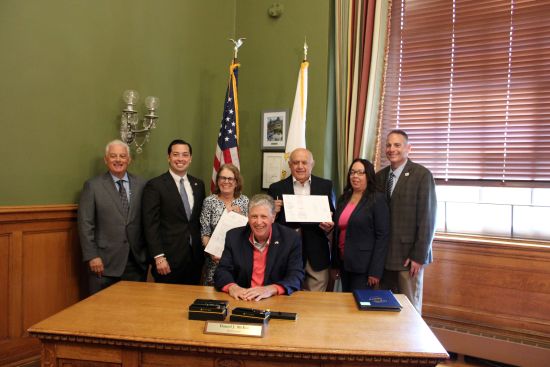Treasurer Diossa Joins Governor McKee, Legislators Ciccone and Cortvriend, Rhode Island Infrastructure Bank, and League of Cities and Towns, in Celebrating Signing of “Resilient Rhody Infrastructure Fund” into Law

PROVIDENCE, RI – General Treasurer James A. Diossa yesterday joined Senate Majority Leader Frank Ciccone (sponsor), Representative Terri Cortvriend, the Rhode Island Infrastructure Bank, and the Rhode Island League of Cities and Towns, as Governor Dan McKee signed the “Resilient Rhody Infrastructure Fund” (H 6252 / S 1070) into law.
The legislation, introduced at the request of the Rhode Island General Treasurer and the Rhode Island Infrastructure Bank (RIIB), establishes a dedicated revolving fund within RIIB to support local climate resiliency projects. The fund will provide municipalities across Rhode Island with access to financing for projects that mitigate the impacts of climate change, including rising seas, flooding, extreme weather events, and other threats to infrastructure and public safety.
“I’m grateful to Governor McKee, the General Assembly, and the League of Cities and Towns for recognizing the urgency of climate change and supporting this effort,” said General Treasurer James Diossa. “The Resilient Rhody Infrastructure Fund will help communities build lasting resilience while also protecting public infrastructure, safeguarding neighborhoods, and promoting sustainable environmental stewardship.”
“Rhode Island families, homeowners, and small businesses know all too well the dangers that extreme weather and climate change can bring to our state,” said Governor Dan McKee. “Thanks to the tireless championing of Treasurer Diossa, the League, and the General Assembly, Rhode Island is ensuring crucial funding is available to bolster and rebuild communities. This legislation is critical in protecting our state’s economic, social, and environmental future.”
“Severe weather has become more and more common in our state, and we have all seen or experienced the disruptions from flooding when our ailing stormwater infrastructure becomes overwhelmed. Acting now to address the growing impacts of climate change will make a major difference for Rhode Island in the years to come, because the costs of inaction – in terms of dollars, and in the potential loss of life and property – are staggering. Supporting resiliency efforts at the local level will allow our cities and towns to address their most urgent needs, and it will provide an outstanding return on investment. I appreciate General Treasurer Diossa, the Rhode Island Infrastructure Bank, and the many other partners who worked to enact this important legislation,” said Leader Frank Ciccone (D-Dist. 7, Providence, Johnston).
“Communities throughout the Ocean State have been experiencing the effects of climate change for years. They need the means to take action to protect our neighborhoods and infrastructure right now, and to plan for a more resilient future. This revolving fund is exactly the sort of resource we need to help local leaders move ahead on this important work to protect people and resources proactively and prevent catastrophic damage,” said Rep. Terri Cortvriend (D-Dist. 72, Portsmouth, Middletown).
“The Resilient Rhody Infrastructure Fund will provide our communities with a reliable, renewable, and affordable funding option to invest in resilient infrastructure projects, furthering our work to build a more Resilient Rhody,” said William Fazioli, Executive Director of the Rhode Island Infrastructure Bank. “We want to thank Governor Dan McKee, Treasurer James Diossa, and the General Assembly for supporting the creation of this important new tool for funding resilient infrastructure projects.”
The Resilient Rhody Infrastructure Fund builds on the success of the Municipal Resilience Program and positions Rhode Island as a national leader in climate infrastructure readiness. By providing long-term, sustainable financing for projects such as stormwater mitigation, coastal erosion control, floodproofing, and urban greening, the Fund will ensure that cities and towns have the resources they need to meet the challenges of a changing climate.